Poetry Themes – 15 of the Most Common Poem Subjects
What is theme in poetry? How many types of themes are there? Do poems need to make use of a theme? This is what we will be exploring and discussing over the course of this article. There are many different themes in poetry, and we will examine some of the most common themes on display. If you’re interested, keep reading to see what you can learn about poetry themes!
A Look at Poetry Themes
There are many different poetry themes in this world, and we are going to explore those different themes. However, let us first ask: What is theme in poetry? Well, this is the general idea or message that a poem is trying to convey to us as readers, and it is often up to us to determine that meaning. This essay will examine fifteen of the most common poem themes, but none of these should be thought of as any more or less important than any of the others. They are all simply different ideas that can be explored. In addition, it should be noted that this list is in alphabetical order to ensure that there is no favoritism on display.
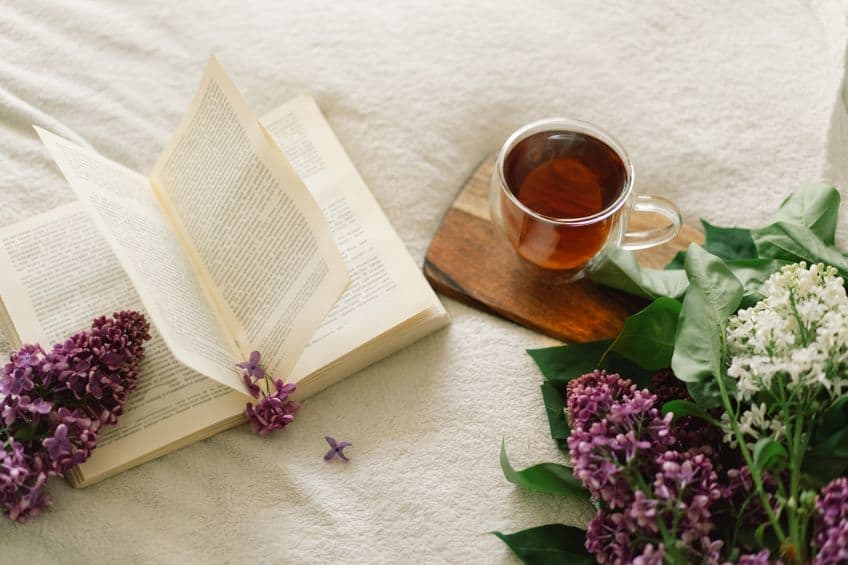
Aging
Aging is often something that we do not want to think about, but that’s what makes it such a resonant poetry theme. We all age and we are all going to die. That is, sadly, one of the realities of our world. Everything must eventually decay, and when it comes to the human body, that decay can come in many forms. Our physical bodies can age and force us into a wheelchair, our minds can age to the point where we can no longer communicate, and our eyes can age to the point where we can hardly see. Every part of our body is constantly aging, and while this is dark, many poets have tackled this as one of the harshest poetry themes.
One of the best examples of this is the poetry collection titled Body Bereft in English by Antjie Krog.
This poet, over the course of this collection, discusses many different aspects of aging, especially from a feminine perspective. These can sometimes come across as crass or even “over-sharing”, but these are the kinds of things that happen to all of us. And we only see these elements of existence as crass because we do not want to face the reality of what is going to happen to all of us if we manage to make it into our old age. Aging comes for us all, and while we can try and run from it, apply anti-wrinkle creams, or add a few hair plugs, it won’t stop coming. And that makes it one of the most powerful and resonant themes for poems.
Beauty
Beauty is, by far, one of the most enduring poetry themes. The exploration and adoration of beauty, which is often paired with love, is a thing that poetry is able to explore in a stunning way. While prose requires constant and comprehensive description, short phrases and words can be used to convey the beauty of an individual in a far more emotive way through poetry, and that is why beauty has become such a persistent theme of a poem. Examples of this poetic theme can be found throughout the history of poetry but are perhaps best known in the work of William Shakespeare.
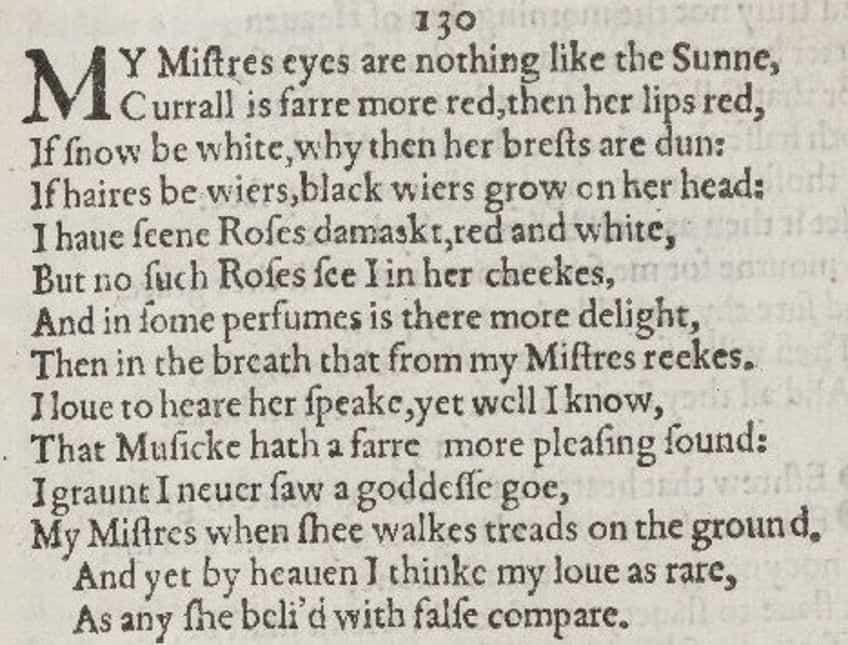
Shakespeare wrote a number of poems that provided discussions about beauty, and many of these examples, such as those found in poems like Shall I compare thee to a summer’s day tend to be overly praising and unrealistic. Examples of poetry that speak about beauty in more divine and over-the-top sentiments are some of the most common examples of these kinds of themes for poems. However, there are also Shakespearean poems like My mistress’ eyes are nothing like the sun, which instead takes a different approach. Much of the poem is concerned with a far crueler examination of a person while pointing out that they are not extraordinarily beautiful, but the poem concludes by instead affirming that regardless, the speaker sees her as beautiful and loves her.
Birth/Rebirth
While something like literal birth may not necessarily be expressed all that often in poetic verse, its consistent use as a metaphor certainly does turn it into one of the most persistent poetry themes. Birth and rebirth often operate together as many poems are about aspects of birth and rebirth in some or another way. For instance, there is a fundamental aspect of rebirth in any spiritual text that makes use of baptism imagery. However, birth and rebirth do not need to only refer to a person and the way in which they may experience a form of metaphorical birth. It can also refer to something far larger.
The immensely lengthy and difficult-to-interpret T.S. Eliot poem The Waste Land is a good example of this particular theme in action.
It describes and explores ideas relating to spiritual and cultural decay that have followed in the aftermath of the First World War. The physical scars on the land have transferred themselves as psychological scars onto the people. It is a melancholic and sad poem in many of its parts, but it does ultimately include a certain vision of a possible rebirth for Europe and the modern world as a whole. There is a way to be rebirthed despite the modernity that has so gripped and poisoned the world around us.
Celebration
We often think of poetry themes as either being very joyous, in the sense of being about love, or we see them as being extremely dark and melancholic. This particular example of poem theme is one of the former. Because while many optimistic poems tend to be about topics such as love, a celebration of something is also something that is happy and exciting. There are many different things that can be celebrated, such as the many poems that celebrate a nation’s independence or the defeat of some terrible event, such as a disease or war. However, celebrations can also be about something more personal.

One of the most stunning examples of a poem that acts as a celebratory piece in a less common sense is Muliebrity by Sujata Bhatt. This stunning poem explores and celebrates the femininity of a woman who is the principal subject of the poem. The speaker discusses a woman they see on the road, and this woman is picking up cow dung. The poem is set in India and cow dung is used for a number of different purposes in the region, and while the picking up of dung may not seem like a celebration, the speaker sees the power of this woman, the poise with which she performs her job, and the way in which she does not appear to have any shame in what she is doing, as something worthy of celebration. This embracing and celebration of a femininity that others may not perceive makes this poem one of the most striking in terms of using celebration as the theme of a poem.
Choice
The idea of choice is something that often fascinates us, and so its place as a major poetry theme is something that does make sense. We all experience choices every day in our lives. Some of those choices are tiny and others are massive and immensely consequential. What does and does not count as a major choice is something that can often only be determined by those of us who are forced to make those exact choices. This means that choice is a constant theme in our lives and a potentially potent theme of a poem. Examples of poems that make use of the general theme of choice are quite common, and, in fact, one of the most famous poems of all time is about choice.
This poem is so well known that practically everyone has done it in school, provided your education was in English.
That immensely famous poem is Robert Frost’s The Road Not Taken. This poem concerns the speaker of the poem arriving at a fork in the road as they make their journey. There are two paths that one could take to complete that journey. One of those paths is far more traveled while the other is hardly ever traveled. The poem is also notable for being widely misinterpreted and misread because it appears to many that the traveler took the road less traveled, but this is not actually the case as the two roads are similar and the poem is instead about the inherent uncertainty in decisions such as this. It is, regardless of the constant misinterpretation, a fascinating and beautiful poem that discusses choice through a simple and easy-to-understand metaphor.
Death
Death is something that comes for us all. This is a very peppy way to start this particular section, isn’t it? However, this is a reality of life. Everything eventually comes to an end. Our lives end and many poets have attempted to reconcile this reality in a number of different ways. This can mean that a poem is about death itself or the aftermath of death. For instance, poems about death may incorporate aspects of mourning into the text to aid in understanding the kinds of feelings that can arise after a loved one has passed away.
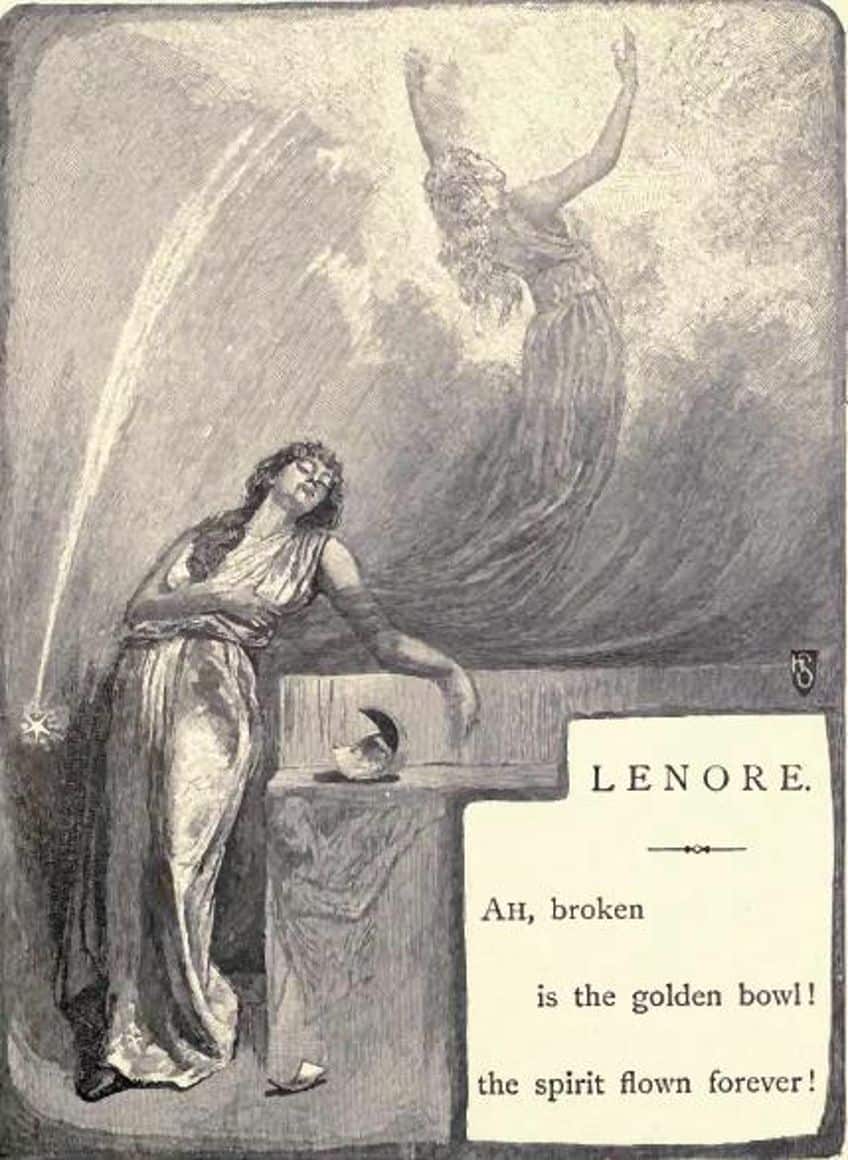
One of the most significant poems that explores this is the Edgar Allan Poe poem, Lenore. This poem concerns the death of a figure known as Lenore and examines the way in which grief can appear very differently in different people. The principal mourner of the poem is the man who would have been her husband, and he is not crying as the other mourners are crying. However, when confronted about this, he flies into a rage about his care for Lenore being so great that he cannot even cry. The poem reveals the different ways in which we cope with death because we do not all see it the same way.
Desire
We often associate the concept of desire with the concept of love, but they are different poetry themes. We can desire without love. In addition, even though the concept of desire has come to hold sexual connotations, we can also desire a great many other things in this life. We can desire something as ordinary as food or as corrupting as political power. There are many different ways in which this concept can be explored, but many iconic poems have explored the concept of desire in a variety of ways.
In this particular case, let’s examine desire from that more erotic angle. One of the most famous poems to focus on this is To His Coy Mistress by Andrew Marvell.
This poem is also considered to be one of the most important in the carpe diem tradition (meaning an attempt to “seize the day” and live within the moment). This particular poem incorporates ideas about aging, decay, and death as it discusses a woman whom the speaker has been attempting to court. This woman has been “coy” and so the poem expresses the reality that we will all eventually fade away and die, and so it would be better to enjoy one another while there’s still time. This is a poem that is often read in a more serious capacity, but it can also be seen in a more humorous sense as the speaker’s desire leads him to use dark imagery in his pursuit of said desire.
Failure
Failure is one of those things that is quite fundamental to our lives. We all experience a combination of successes and failures, but many of our successes are things that we ignore or pay no real heed to. It is in failure where we truly feel many of the most dreadful emotions that we can experience. The feeling that we have not achieved what we should have achieved, that we have not done as much as we should have done, and that we are not as successful in our lives as we should have been, are all different ways of examining failure.

In the Amos Russel Wells poem that is aptly titled Failure, the subject discusses the way in which failure should not simply be seen as something fundamentally pessimistic because it is only through failure that we can truly grow and improve. Failure should not be viewed in a purely negative light but should also be seen as a means of growing within this world of ours.
Identity
We all have an identity of some description. That identity is the way in which we see ourselves, and the way in which we see ourselves can be determined through a number of different avenues. We can see ourselves through a variety of means, such as through our jobs, our familial ties, our romantic attachments, our hobbies and interests, and so on. Many poems attempt to explore this idea, and it makes sense why this is the case as understanding ourselves is something that is difficult to do.
If it were easy to fully understand ourselves, then there would be no need for therapists in this world.
A poem that explores this through a nostalgic lens is Isobel Dixon’s Plenty. This poem contains a retrospective look at the upbringing that the speaker in the poem experienced. They were raised in poverty that she did not truly understand, and she often saw her mother in a crueler light because of it. However, with the benefit of hindsight, she starts to see and understand why her mother was the way she was, and how this also shaped the way in which the speaker grew and developed. For instance, unlike her mother, who never allowed deep baths, she always has deep baths now, and this was directly inspired by her childhood experiences.
Immortality
Immortality has, ironically, remained one of the longest-lasting poetry themes. It has a lengthy history and can be found in many poems through the ages. This particular poetry theme is also one that does make sense as one of the realities of the human is that we will die. This has already been explored in both the Death and Aging themes, but one of the things that come out of our inherent fear of death is the idea of leaving something behind. There is a desire to leave some kind of a legacy. That legacy may be in the form of things that we have created or the children that we have raised. Poetry often examines this reality.
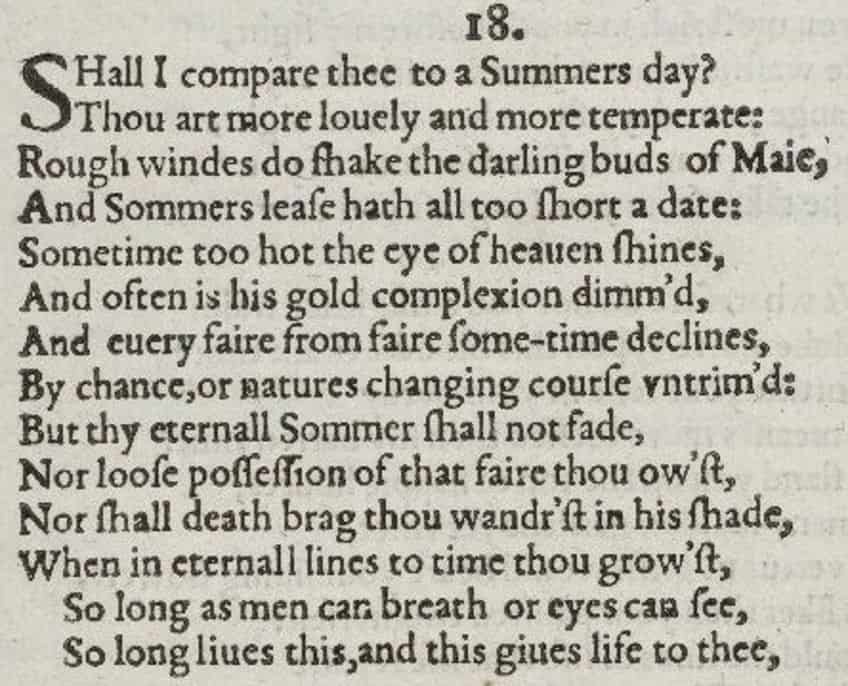
One of the most famous poems to make use of an immortality theme is William Shakespeare’s famous Shall I compare thee to a summer’s day? This poem is also concerned with ideas around beauty. There is the recurring idea that the poetic subject of the poem, the Fair Youth character, is a truly beautiful figure. They are a gorgeous sight to behold, but one of the realities of our existence is that beauty fades as we age, and so the speaker claims that this beauty will instead forever live within the poem. It will achieve immortality in the literary space even if it does not achieve this in the physical world.
Journeys
While there are many themes for poems in this world, many of them do not necessarily attain the same level of notoriety as others. Journeys are one of those themes. The idea of a journey, of transitioning from one place to another, either in metaphorical or literal terms, is a common poetry theme that, nevertheless, is not quite as famous as a theme such as love. Regardless of this, journeys can be used in a variety of ways as the theme of a poem. We all embark upon journeys over the course of our lives, and they can have a profound influence on the way in which we see and experience the world.
A good example of a poem that makes use of this theme, in a sense, is a poem like Dennis Scott’s Marrysong.
This poem is also about love, and it involves the ever-changing landscape around us that we must traverse. The poem calls a landscape to attention, one that we must forever walk across without ever actually reaching a destination. We must forever charter this land and travel through it even though we can never learn it all. However, this journey is used as a metaphor to explore the idea of love, that loving someone is like a constantly changing geography that must be continually traversed. This is a beautiful example of the way in which a theme can be used in a purely metaphorical sense.
Love
Love is perhaps the most famous of all poetry themes. This does not mean that most poems are about love, but rather that a disproportionate amount of attention is paid to love in terms of poetry. Even in a pop cultural sense, we tend to view love as a default aspect of poetry, and endless films show us that using poetry in courtship is considered to be lovely and romantic. Love as one of the most famous poetry themes does also make sense because love is an expression of an emotion that many struggle to truly grasp, and the structure of the poem is a powerful medium through which raw and unfiltered emotions can be protected. Poetry is far better at this raw expression of emotion than prose because it does not require the pretense of a narrative justification of any kind.
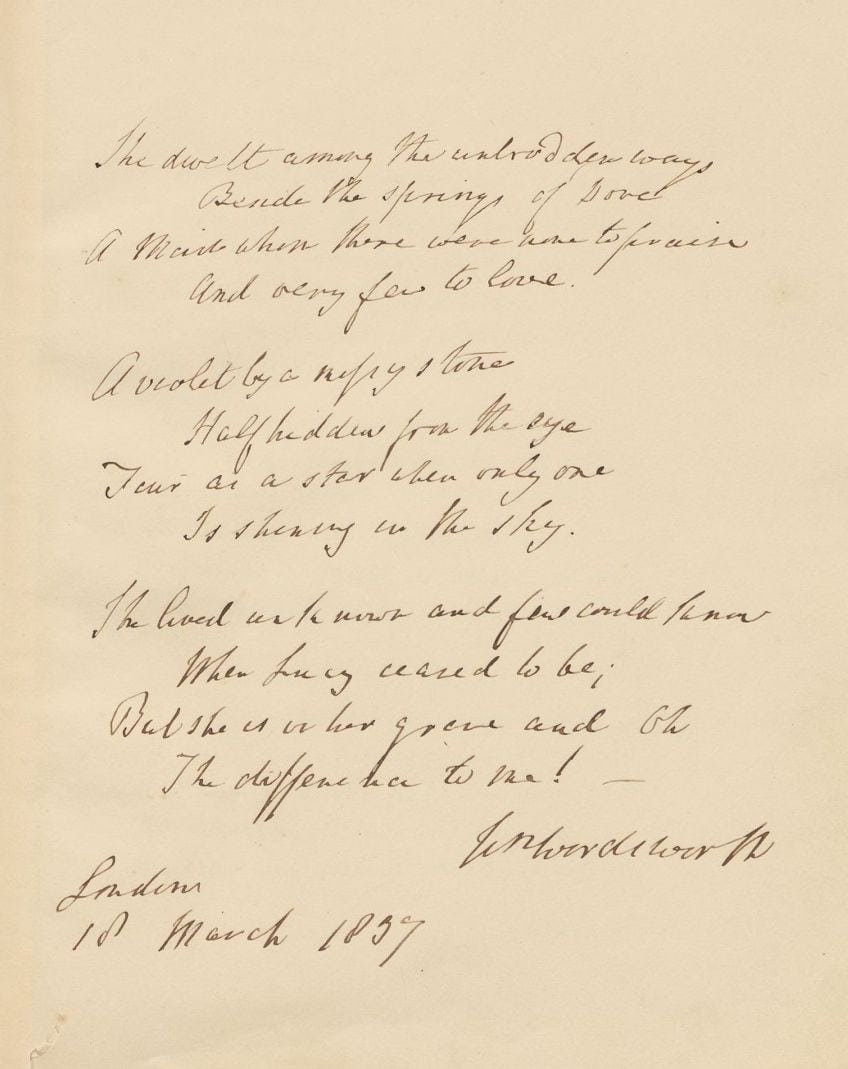
A fantastic example of love as a theme in poetry can be found in She Dwelt Among the Untrodden Ways by William Wordsworth. This poem is a more understated kind of love. It lacks the overly exaggerated forms of love poetry that may be found in something like Shakespeare’s Shall I compare thee to a summer’s day, and is instead far more focused on the speaker’s love and adoration for the enigmatic character of “Lucy”. She is described in less-than-flattering terms. For instance, she is called a shining star provided there are no other stars in the sky. However, her underwhelming beauty and possible plainness instead lead to her being treasured and beloved by the speaker. His love for her is not from a place of idealistic adoration, but rather from a realistic perspective.
Nature
The natural world has long been a source of adoration among many poets. There have been many instances throughout the history of poetry that have used nature as the theme of a poem. Examples of this especially abound in many examples of Romantic poetry (Romantic as in the literary movement rather than in terms of love), and these figures often wished to show the stark contrast between the beauty of the natural world and the disgustingness of the urban environment that was constantly expanding over the course of the Industrial Revolution.
These poets wanted a return to nature as something that was far superior and more divine than the general ugliness of the urban landscape.
One of the most stunning examples of an appreciation for nature as the theme of a poem can be found in Amends by Adrienne Rich. This poem draws specific comparisons between the Divine Feminine and the natural world. The poem itself is a fairly difficult poem to read, but its fixation on the way in which the light of the moon illuminates and casts its way over that which has been constructed by humanity shows the way in which the natural world is actually continually watching over the domain that humans supposedly have over what they have created.
Spirituality
Spirituality is, in general, one of the oldest themes that can be said to have been used as a poetry theme. This becomes especially true when combining spirituality and religion. These two form composite parts of some of the most important ancient texts. For instance, many of the oldest poems relate to mythological figures and stories, and while we often prefer to provide a distinction between “mythology” and “religion”, it is worth noting that those ancient mythological stories were followed as religious belief. This means that the ancient Greek epics were actually relating religious narratives.
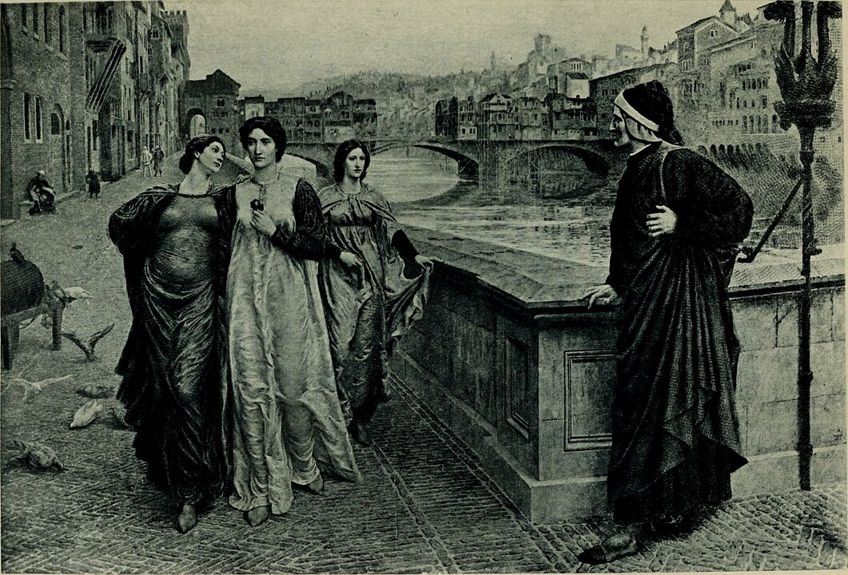
However, in terms of living religions, texts such as Dante Alighieri’s The Divine Comedy and John Milton’s Paradise Lost may be considered important texts in the history of Christian literature. Texts such as these can relate to religious ideas and feelings as a means of exploring these concepts and attempting to understand them. There are many different ways in which personal thoughts and beliefs on spiritual matters can be presented to potential readers. These kinds of themes for poems can allow poets to try to grapple with their own thoughts, understand the teachings of religious texts and institutions, and so on.
War
The idea of war as a theme in poetry is relatively recent in terms of a more personalized response to it. While there have been many ancient poems that explored grand battles and conquests, there were comparatively few that viewed these aspects of human existence from the perspective of the ordinary soldiers who had to go up against this terrible reality of the human world. Some of the most notable of all the war poets originated during the First World War. It was during this period of time when the first truly modern war had begun, and there were many new and terrifying ways in which war could be waged.
For instance, for the first time, an artillery shell could seemingly land on you from an unfathomable distance and kill you before you even realize what has happened.
One of the most famous of these war poets was Wilfred Owen, who died a week before the end of hostilities in the First World War, and one of his most significant poems on what occurred in that war can be found in his iconic poem Dulce et Decorum Est. This poem describes the way in which gas was used in the war, and it specifically focuses on how that gas fills the trenches that were commonplace throughout the war. The poem describes the choking and drowning that occurred in those trenches as soldiers struggled to breathe as they tried to make their way through and survive the kinds of gas attacks that were a constant throughout that terribly bloody war. This theme, and poetry themes like it, are a powerful reminder of the way in which poetry can convey the darkest of human moments.
The Use of Multiple Themes in Poetry
It may have been noted over this lengthy examination of a number of different poetry themes that the themes that are explored do not necessarily get explored on their own. This is something that should also always be taken into account. A poem that is about love may also incorporate aspects of nature, aging, immortality, and death in its imagery. This does not invalidate its place as a love poem, but it does lead to increased overall complexity.

Poetry can be simple or complex, and the more themes that are explored within a poem, the more complex it might become for those who are reading it. This possibility of complexity should be kept in mind when analyzing or writing poetry. Never assume that there can only be one theme because there can indeed be a great many different themes that can be explored and examined in poetry.
And so, we come to the end of the examination of poetry themes. We have examined a number of different poem themes over the course of this article, and have attempted to answer the general question: “What is theme in poetry?”. Hopefully, the article has discussed this in enough depth to provide you with a good understanding and appreciation of the many different themes that can be found in poetry.
Frequently Asked Questions
What Is a Theme in Literature?
A theme is some kind of an idea or message that is elaborated throughout a piece of literature. There are many different types of themes that can be explored, and one of the more notable aspects about themes is that they are often never stated in any kind of an explicit sense. Instead, they require interpretation of a text to fully understand and appreciate them.
What Is Theme in Poetry?
Poetry themes are any themes that are, in some way, expressed in a poem. Themes can come in a number of different varieties, and they serve a number of different purposes. These are the messages or ideas that can be found within a poem, which are generally never stated and instead need to be understood through reading and analysis of the poem.
What Are the Most Common Types of Poetry Themes?
Some of the most common poetry themes are ones such as love, immortality, and death. These are the kinds of themes that one tends to see in many different poems because they are often viewed as elements that are more universal in their application. We all experience thoughts and feelings about these topics, and so it makes sense for a poet to wish to explore them.
What Is the Theme Most Associated With Poetry?
It is quite probable that love is considered to be the theme most associated with poetry. It is quite an interesting thing because we do not have a specific theme that we associate with prose, drama, film, and so on. However, this may be because many of the most famous poems tend to be love poems, and they are commonly taught in school while being elevated and emphasized in a variety of different pop cultural sources.
Can a Poem Have No Theme?
A poem without a theme essentially means a poem with no meaning. One could, theoretically, make use of nonsense phrases, but even this is actually a type of theme. So, even when specifically attempting to deny a theme when writing a poem, a theme may inadvertently be produced.
Justin van Huyssteen is a freelance writer, novelist, and academic originally from Cape Town, South Africa. At present, he has a bachelor’s degree in English and literary theory and an honor’s degree in literary theory. He is currently working towards his master’s degree in literary theory with a focus on animal studies, critical theory, and semiotics within literature. As a novelist and freelancer, he often writes under the pen name L.C. Lupus.
Justin’s preferred literary movements include modern and postmodern literature with literary fiction and genre fiction like sci-fi, post-apocalyptic, and horror being of particular interest. His academia extends to his interest in prose and narratology. He enjoys analyzing a variety of mediums through a literary lens, such as graphic novels, film, and video games.
Justin is working for artincontext.org as an author and content writer since 2022. He is responsible for all blog posts about architecture, literature and poetry.
Learn more about Justin van Huyssteen and the Art in Context Team.
Cite this Article
Justin, van Huyssteen, “Poetry Themes – 15 of the Most Common Poem Subjects.” Art in Context. September 14, 2023. URL: https://artincontext.org/poetry-themes/
van Huyssteen, J. (2023, 14 September). Poetry Themes – 15 of the Most Common Poem Subjects. Art in Context. https://artincontext.org/poetry-themes/
van Huyssteen, Justin. “Poetry Themes – 15 of the Most Common Poem Subjects.” Art in Context, September 14, 2023. https://artincontext.org/poetry-themes/.




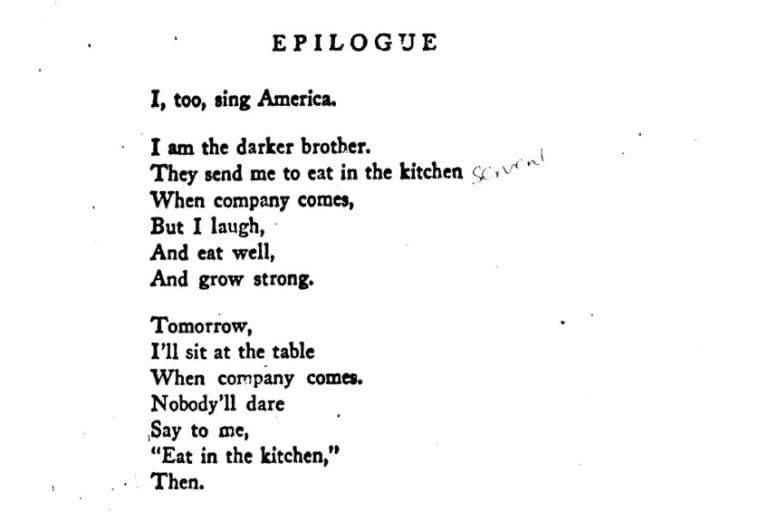

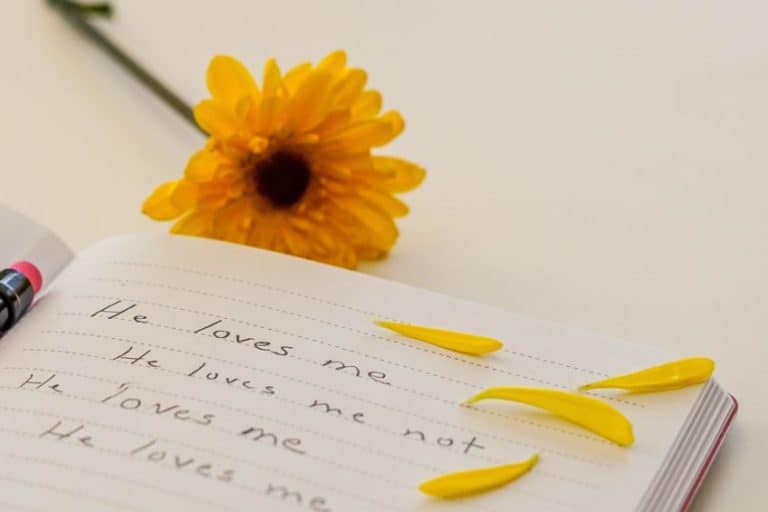
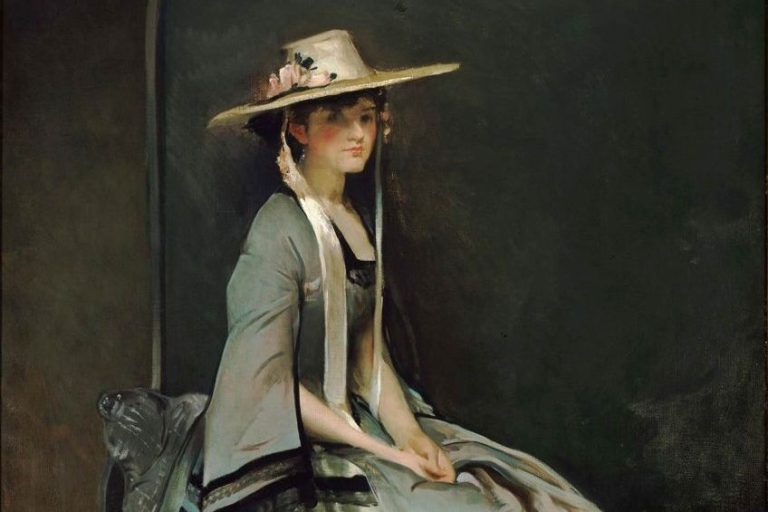
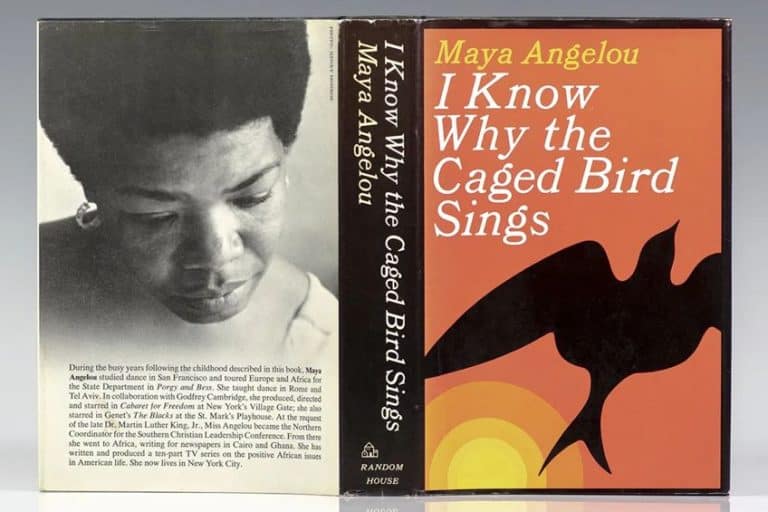

Great. I am happy!